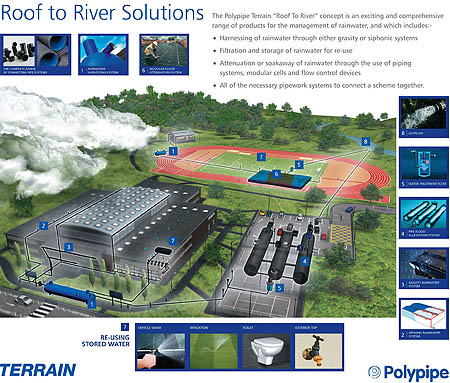Sustainability isn't just a pipedream... at Polypipe we're making it happen!
With Ecologists warning that the planet is running short of water, Polypipe says now is the time for the construction industry to be doing more than just the bare minimum to meet legal requirements. Instead they should be taking advantage of technologies that exist today to help secure the water needs of the planet for tomorrow.
A swelling global population, changing diets and mankind's expanding 'water footprint' could be bringing an end to the era of cheap water according to a warning in an annual report by the Pacific Institute in California. And, according to Peter Gleick, the president of the Pacific Institute, the world is in danger of running out of 'sustainably managed water'. (See THE TIMES 22 January 2009)
A key element to tackling the crisis, the report says, is to increase the public understanding of the individual water content of everyday items. A glass of orange juice, for example, needs 850 litres of fresh water to produce, whilst a hamburger comes in at 2,400 litres of fresh water, depending on the origin and type of meat used.
'With such a major global issue, it's vital that we make use of every available opportunity to save, re-use and re-cycle water and, where we return it back to the ground, we do so in a managed way,' comments Dr Jason Shingleton, Marketing and Development Director, Polypipe Civils.
Polypipe has a dedicated team of Civil Engineers, Drainage Specialists and Technical Support experts to focus on providing sustainable drainage and water management solutions (WMS) to the UK construction and civil engineering industries. Shingleton continues. 'It's one thing to comply with existing regulations, but to exceed them in preparation for future legislation is typical of Polypipe's innovation and forward thinking - and many of our Water Management Solutions allow the construction industry to do just that, minimising the impact of the built environment.'

Polypipe's Sustainable Drainage Systems (SUDS) include rainwater harvesting, soakaway and attenuation solutions designed to prevent surface water from entering the existing drainage system or watercourse unchecked. Polypipe's solutions allow the construction industry to meet SUDS best practice by limiting the flow of rainwater which runs off-site or is piped away, protecting local watercourses from the contamination carried in surface run-off, encouraging natural groundwater recharge (where appropriate), and reducing the likelihood of downstream flooding.
Rainwater harvesting solutions collect water where it falls (rather than forcing it to drain away where it can add to flooding problems) and also reduce the demand for treated mains water by re-using the harvested water for activities such as garden watering, toilet flushing and clothes wash.
The Ecovat rainwater harvesting system, is just one example of a range of solutions that Polypipe can offer to help alleviate water shortages, aiding achievement of The Code for Sustainable Housing Levels 4,5 and 6 for both internal and external potable water use*.
Rainwater harvested from an Ecovat system can replace up to 50% of the domestic demand for non-potable water for applications such as toilet flushing. In Commercial, Industrial and Retail applications the cost of water, combined with increased demand and larger roof catchment areas, mean that short paybacks can be achieved. (See case study below)
Roof to River
Polypipe products are designed to work as stand alone storage, infiltration, attenuation or pipeline solutions or as part of a holistic water management scheme that controls, cleans and releases surface water run-off. This seamless integration means we can provide a complete water management solution from roof to river. (See image)
'In these difficult economic times it is easy for companies to look to cut costs by doing just the bare minimum. We suggest that, given the Pacific Institute's report, now is in fact the time to do more, not less, to secure the future water supplies for the planet', concludes Shingleton.
* Level one is the entry level - above the level of the Building Regulations; and level six is the highest level - reflecting exemplar development in sustainability terms.
For more information on Polypipe Water Management Solutions
http://www.polypipewms.co.uk
To read the full Times article
http://www.timesonline.co.uk/tol/news/environment/article5562906.ece
http://extras.timesonline.co.uk/pdfs/wateruse.pdf